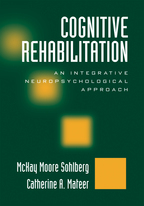Cognitive Rehabilitation
Second Edition
An Integrative Neuropsychological Approach
McKay Moore Sohlberg and Catherine A. Mateer
“This book is precise, well organized, and easy to follow. It covers the main topics of concern to clinicians and families, and the sequence is logical and clear. Sohlberg and Mateer have a real gift for explaining difficult concepts in ways that make them seem completely understandable and sensible. In addition to these strengths, the book's balanced perspective and solid theoretical grounding really make it stand out among others in this area.”
—Jill Winegardner, PhD, Neuropsychology Consultant, Dominican Hospital, Santa Cruz, California
“Like the authors' original seminal text, this volume provides a systematic, practical framework that is clearly referenced to contemporary theory and research. In addition to up-to-date information on cognitive rehabilitation, the volume is enhanced by chapters on behavioral and emotional disorders, the special needs of children, and mild brain injury. In all areas, current best practices are described and accompanied by an extensive array of worksheets, assessment and monitoring tools, and other useful supporting materials. Sohlberg and Mateer have once again produced the premier text in the area. It belongs within arm's reach of any professional or student in disciplines providing post-acute brain injury rehabilitation services.”
—James F. Malec, PhD, Professor and Director of NIDRR Traumatic Brain Injury Model System, Mayo Clinic and Foundation
“This is probably the best book on neurobehavioral remediation on the market. It is grounded in the neuro- and cognitive sciences while based on the authors' extensive rehabilitation experiences. The science is sound; the methodology is practical, effective, and respectful of the patient's dignity and well-being; and the coverage of conditions and issues is comprehensive and up to date. Students and practitioners alike will profit from the knowledge, technical advice, and practical admonitions these experienced and insightful clinicians provide.”
—Muriel D. Lezak, PhD, Department of Neurology, School of Medicine, Oregon Health and ScienceUniversity
Table of Contents
I. Fundamentals for Practicing Cognitive Rehabilitation1. Introduction
2. Neurological Disorders Associated with Cognitive Impairments
3. Variables Contributing to Neurological and Neurobehavioral Recovery
4. Assessment of Individuals with Cognitive Impairments
II. Management Approaches for Cognitive Impairments
5. Management of Attention Disorders
6. Memory Theory Applied to Intervention
7. The Use of External Aids in Cognitive Rehabilitation
8. Management of Dysexecutive Symptoms
9. The Assessment and Management of Unawareness
10. Communication Issues
III. Interventions for Behavioral, Emotional, and Psychosocial Concerns
11. Managing Challenging Behaviors
12. Management of Depression and Anxiety
13. Working Collaboratively with Families
IV. Working with Special Populations
14. Rehabilitation Strategies of Children with Acquired Cognitive Impairments
15. Management Strategies for Mild Traumatic Brain Injury
About the Authors
McKay Moore Sohlberg, PhD, is a nationally recognized leader in the field of traumatic brain injury rehabilitation. For the past 16 years she has worked as a clinician, researcher, and administrator in the development of programs to assist individuals with brain injury to reintegrate into the community at maximal levels of independence. She has published numerous articles, chapters, and manuals on managing cognitive impairments following neurogenic insult. Dr. Sohlberg is currently an associate professor in the Communication Disorders and Sciences program at the University of Oregon.Catherine A. Mateer, PhD, is a board-certified clinical neuropsychologist with an extensive background in clinical assessment, clinical intervention, and both basic and applied research. She has published over 75 articles and book chapters and two previous books relating to brain organization for language, memory, and praxis, as well as to the assessment and management of acquired disorders of attention, memory, and executive functions. Dr. Mateer is widely known for her pioneering work in the rehabilitation of individuals who have sustained traumatic brain injury. She is currently a professor in the Department of Psychology and the Director of the Graduate Program in Clinical Psychology at the University of Victoria in British Columbia, Canada.
